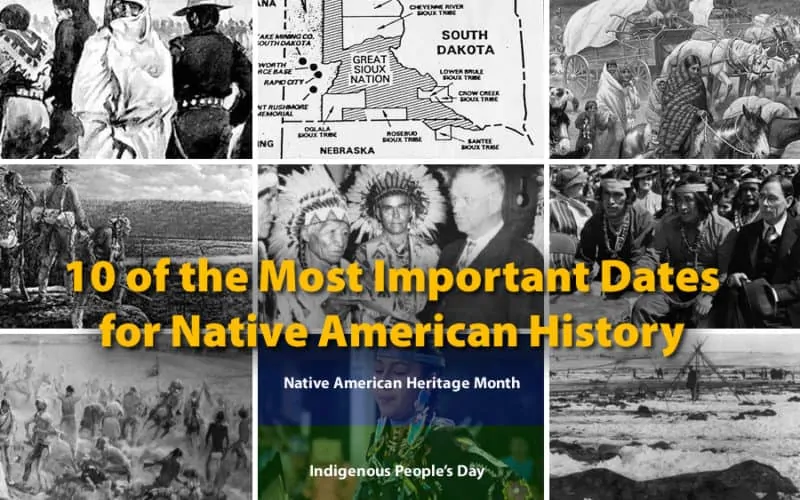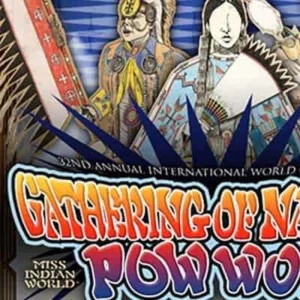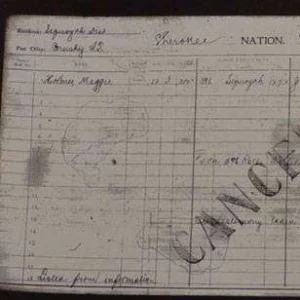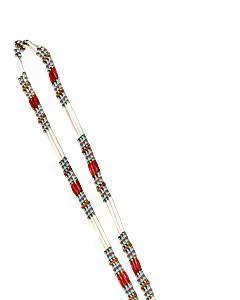The annals of Native American history are a testament to resilience, cultural heritage, and the enduring spirit of indigenous communities across the Americas. In this exploration, we embark on a journey through time, unveiling pivotal dates and events that have shaped the rich tapestry of Native American history. These milestones bear witness to both the triumphs and tribulations of Native American and Alaska Native peoples, leaving an indelible mark on the collective consciousness.
Beyond borders and backgrounds, the significance of these historical markers transcends ethnicity, offering valuable insights into the broader narrative of American history.
Join us as we delve into the annals of time and uncover the stories that have molded the past, present, and future of indigenous communities. Each date, etched with historical significance, invites us to reflect on the enduring legacy of Native American history, reminding us of the importance of recognition, understanding, and respect for the diverse cultures that have thrived against all odds.
Come, walk this path with us, and discover the stories that have long deserved a place in the annals of history.
Navigating the Tapestry of Native American History: Key Milestones and Their Enduring Significance
Ghost Dance
January 1, 1899
A Native American named Wovoka had a mystical experience that urged him to tell other natives to change for the better and take part in the Ghost Dance ritual to prepare for an age of peace and prosperity.
Allotment/Dawes Act
February 8, 1887
This law, passed by the U.S. government, said that every head of each Native American family was to get 160 acres of tribal land, while every individual would get 80 acres. This act was predominantly seen as an alternative to mass genocide by U.S. forces.
Trail of Tears
April 5, 1838
President Andrew Jackson ordered the Cherokee off their Native American tribal land against a ruling by the U.S. Supreme Court. The path they took became known as the Trail of Tears.
Pontiac’s Rebellion
May 1763
A loosely-knit confederation of Native American tribes in the Great Lakes, Illinois, and Ohio regions rose up against the British forces. They were successful and persuaded the British government to change national policies to be more favorable toward Native Americans.
Indian Citizenship Act
June 2, 1924
This law granted U.S. citizenship to Native Americans living in the United States. This act removed the ambiguity of the 14th Amendment to the U.S. Constitution regarding who was considered to be a citizen. It's without a doubt, one of the most important dates in Native American history.
Indian Reorganization Act (Indian New Deal)
June 18, 1934
This act helped reverse much of the “cultural assimilation” imposed on Native Americans earlier in U.S. history. Its goal was also to strengthen, encourage, and continue Native American cultures in the U.S.
Battle of Little Bighorn
June 25, 1876
Native chiefs Crazy Horse and Sitting Bull led armies of Lakota, Cheyenne, and Arapaho Native American tribes to a glorious victory over the vicious assault of U.S General George Custer and his army.
Native American Heritage Month
August 3, 1990 (Observed every November)
This is a relatively new holiday providing a national platform for Native Americans to share aspects of their culture with others. It also offers the opportunity to express their concerns and proposals. Now, every November, we get to collectively look back on Native American history and pay tribute to the accomplishments of indigenous peoples and American Indian nations that have stood the test of time.
Indigenous Peoples' Day
October 12, 1992 (Observed on the 2nd Monday of every October)
This is a relatively new holiday celebrating and honoring Native Americans, as well as their history and culture in the United States. It has increasingly been replacing Columbus Day in cities and states throughout the United States. It's an important acknowledgment of Native Americans still living in the United States and the land their ancestors once inhabited.
Wounded Knee Massacre
December 29, 1890
US.. cavalry opened fire on Sioux Native Americans at Wounded Knee Creek, resulting in 300 killed, including women and children. This marked the end of armed Native American resistance to hostile Western forces. It marks one of the most significant dates in 19th century Native American history.
Which date in Native American history is most significant to you?
Let us know in the comments!
2024 Countdown to Gathering of Nations Giveaway
Bonus Code – 748399
Last Updated on March 15, 2024 by Paul G





BB GRACE
says:KONKOW TRAIL OF TEARS
AKA The Nome Cult Trail
https://www.californiatrailcenter.org/the-nome-cult-trail/
Anjela
says:Honor to those whose lives were taken for a pointless and useless evil. My heart breaks.
Morningstar
says:The citizenship act is most important, however the worst atrocity today is that some of the reservation still do not have clean running water to this day. However with water with blessings that will soon come to an end. Water with blessings has developed a filtration system to clean the water. The europeans have been so hard on the indiginious people that most of them still think it is ok to call us indian. What a shame.
Robin A Enos
says:Native American Heritage Month
August 3, 1990 (Observed every November)
So we never forget any of the 10 and all the broken treaties.
Let’s all hope Debra Haaland can accomplish many things for Native Americans.
sprite carnberry
says:wow
Debbie
says:I would have said Wounded Knee, but the truth of the matter is that the Trail of Tears took more Native American lives. Also, they died a slow and painful death being slowly starved to death and forced to walk hundreds of miles during the winter months. The elements took their toll. The fallen were not even allowed a proper burial. Their bodies were left in unmarked graves along the trail they walked. I can’t imagine the grief of the survivors.
Laura Harrison
says:I just live a few miles from part of the trail of tears that runs through West Tennessee. I walk the area and when the breeze blows through the trees it brings a sound of the anguish that the people who walked there long ago felt. Ranis are mixed with tears and my footsteps on the ground are the heartbeats of souls driven by injustice.
Debbie
says:I live right around the corner from where the Trail of Tears began. When I hike the footpaths along the Tennessee River and see the fall leaves drop I think of them as well. Their spirit is very much alive here in Vonore. The Cherokee are a very gracious and forgiving people. i was happy to read today that recently the plains tribes have been given back the buffalo on their lands and are responsible for their care. I hope they will be able to hunt them again as their ancestors once did. I am sure the buffalo and the land is in good hands – they are excellent caretakers.
Teresa
says:My family is part Cherokee & Seminole, where my great great grandfather is on indigenous rolls as well as Dawes rolls as he was Cherokee medicine man and my great great grandmother was Seminole- they made my great grandfather register as half because he was mixed tribes so they didn’t have to give him the amount of land 160 acres or benefits as such for Full Native Heritage. Later they took land back as they were marched on trail of tears where my great grandfather was taken to was Oklahoma Rez. My great great aunt died on trail of tears, my great great grandmother was her sister who was married to my great great grandfather the Cherokee medicine man. He would go to the trade days and translate deals & other business as he spoke 5 dialects of the languages. History teaches us lessons. If we learn from it, carrying the triumphs with heartaches that occurred teaches you to be a better person walking in path of wisdom & creating peace.
Running Doe
says:osiyo the trail of tears breaks my heart, I have watched over and over with tears in my eyes, the sad things our people had to go thru, , but we are still here and proud, wado Running Doe
Debbie
says:You belong to a very gracious and proud people. It is an honor to live where your ancestors once thrived. I am learning so much about the Cherokee people this month as it is Native American Month. Every day I research and learn more about what a remarkable people you are. I can only apologize for the atrocities visited on your ancestors by an unforgiving invader to your land.
SHIRLEY WOOLSEY-MORANT
says:HOPING SOMEONE JOINS ME IN THIS ENDEAVOR…
norb Schott
says:I am not native but thru pow wow s have come to love the Native Americans!
I often carry a flag at opening because I am a veteran. (of Vietnam war) I am so
honored by this. thanks and thank you all veterans.
Louis Pocha
says:It saddens my heart for our relations
Denyce
says:All these dates are significant. The fact that these dates and the history of Native Americans, the indigenous people of this country, is not taught in school is an indication of whites embarrassment for their sins. If I have to pick one, it would be the Citizenship Act of 1924. Which is ridiculous that indigenous people need an Act to become citizens of their own country. Further more, it wasn’t until 1964 that Utah, the last state to received the right to vote.
Debbie
says:Denyce,
I have to agree with you. The Citizenship Act of 1924 is ludicrous and just goes to show how arrogant the US government is. It just makes me sick. I also agree with you that the Native American people’s history should be taught in school. as a retired teacher, I think it should be taught HONESTLY with both sides owning their part in what happened. I have no doubt that the US will have the lion’s share of the responsibility for wrongdoings. Today there are some small efforts happening to reverse the past though. I just read that Tennessee is returning some of the ancestral grounds to the Cherokee and that the plains tribes in Montana are being given back the care of the land and buffalo on their land. I know these are miniscule efforts but at least they are a step in the right direction.
KarenKay Hutton
says:All of them have very deep meaning to me, but I know I wouldn’t be here if my Great GrandFather hadn’t been able to escape The Trail Of Tears, as a very young boy.
He found a family to hide him and adopt him, as long as he never spoke his true name or language again.
That’s just one of the ‘deadends’ to me finding my true name and real blood familes.
Diana Leanne Roberts-Elza
says:Just want to say how much I appreciate your site, it is literally the best out there on all topics Native. Very informative, no filler content to take up space. Every subject I’ve looked at contains indispensable information. Thank you!!
Red Collins
says:I agree with all of your picks but I would add the Eagle Dance
Tobie Fletcher
says:I’d say it’s a toss up between Wounded Knee and the Trail of Tears. Both were so significant in showing how relentless the whites were towards the control of the native peoples. I might actually say today since the war never ended. Native Americans are still persecuted and dismissed as humans and citizens.
Roberto Barboza
says:Indigenous day, to be recognized throughout the country that we exist and we are not going to fade away.
Marcia Newton
says:Actually, the purge of the Allotment/Dawes Act is most critical to my family. Though the actual date(s) of that purge nor names removed are not clearly documented so, it’s a constant reminder.
Patrick Winter
says:I would have to go with trail of tears. That strikes me to the core so much that I have my lower legs tattooed with the symbol of the Native American sitting on his horse! The way our relatives were demeaned has always saddened me. We are survivors. We are strong. We are proud. Most of all, we are all brothers and sisters.
SHIRLEY WOOLSEY-MORANT
says:YES. WHAT YOU SAY IS TRUE. WE MUST FIND A WAY TO ESTABISH OUR POSITION POLITICALLY SO WE CAN FIGHT FOR WHAT IS REIGHTFULLY OURS…
Jim
says:Tobie,I could not agree with you more.
Jim
says:I say mine would be The Trail of Tears and Indian Citizenship Act. My family has lived in East TN and Western NC for over 400 years. What little I’ve been told my family hid in the mountains. My mom and dad always seem to be ashamed or something of our Cherokee Heritage. I got my looks more from my grandma any way,nose,eyes,darker hair than either of my parents. My mom always made me feel like she was embarrassed by me.
SHIRLEY WOOLSEY-MORANT
says:HOW TRUE YOUR COMMENT IS. LET US CREATE AN OPPORTUNITY FOR ALL NATIVE AMERICAN PEOPLE TO RISE ABOVE THE LIMITATIONS OTHERS HAVE CREATED THAT INHIBIT THEIR RIGHTFUL POSITION IN THIS DEMOCRACY WITHOUT LOSING THEIR IDENTITY.